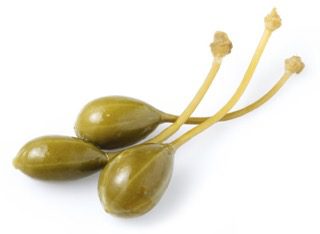

Dogs can safely eat capers, which offer several health benefits due to their vitamin and mineral content. However, store-bought capers may have high salt levels, and overfeeding can lead to adverse effects.
Capers provide calcium, vitamin K, and magnesium, promoting healthy bones and teeth. They are also rich in fiber, aiding digestion and preventing gastrointestinal issues. Additionally, capers contain antioxidants that protect against cell damage and regulate inflammation.
Capers preserved in brine have high sodium levels, and excessive consumption can lead to sodium poisoning in dogs. Whole caper buds pose a choking hazard. While store-bought capers are safe, avoid foraging for wild capers as some lookalikes are poisonous to dogs.
To reduce salt content, soak and rinse capers before removing stalks and giving them to your dog in moderation as an occasional treat.
Capers are small, pickled flower buds commonly used as a seasoning in various dishes. They are low in calories and high in antioxidants, making them a healthy addition to a dog's diet. Capers also contain flavonoids that can help reduce inflammation and improve heart health in dogs. However, it is important to note that capers are high in sodium, which can be harmful to dogs with heart or kidney issues.
In extreme cases, excessive consumption of capers can lead to sodium poisoning, which can cause vomiting, diarrhea, seizures, and even death. If a dog accidentally consumes a large amount of capers, it is important to seek veterinary attention immediately.
Two safer alternatives to capers for dogs are fresh herbs like parsley or cilantro, and unsalted green olives. A serving idea for dogs is to mix a small amount of chopped capers into their regular food as a flavor enhancer.